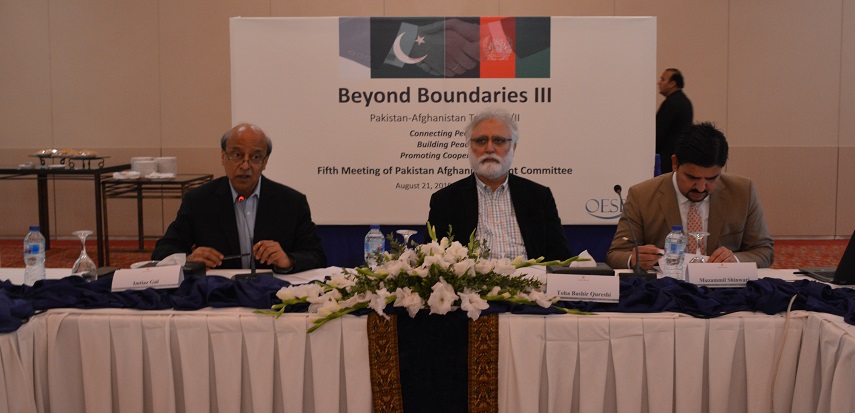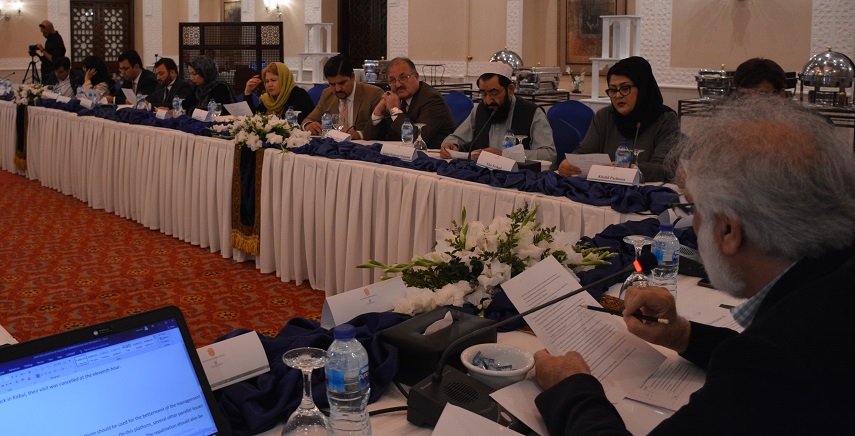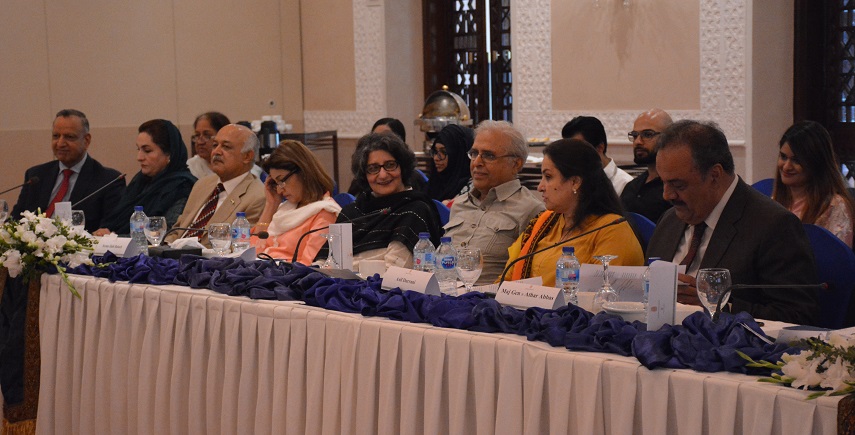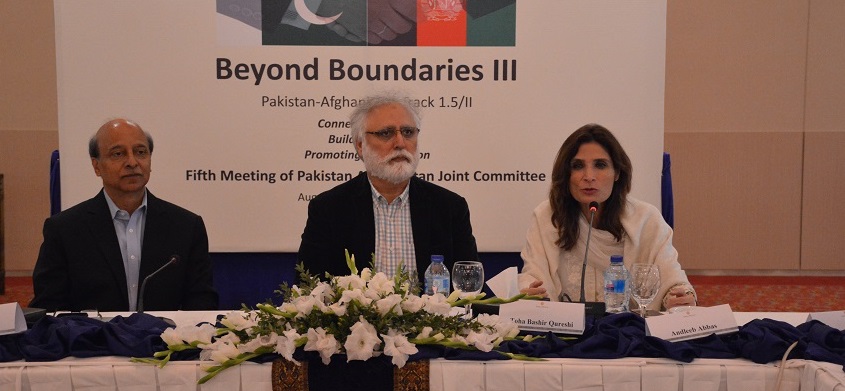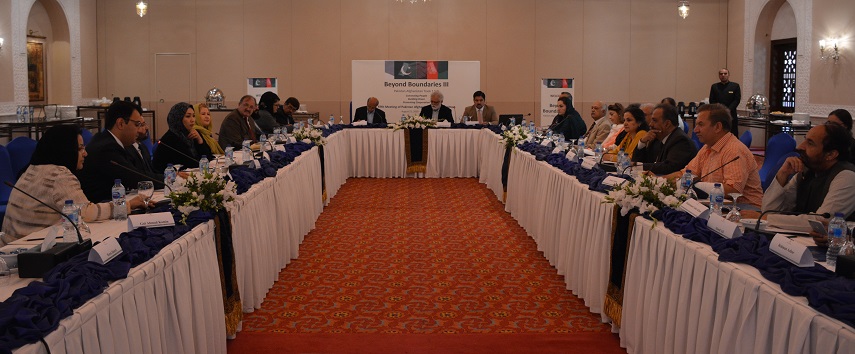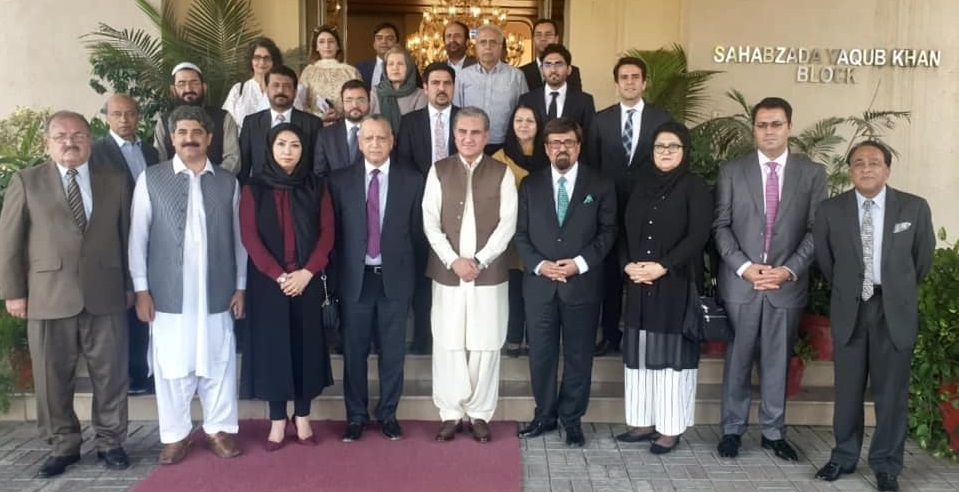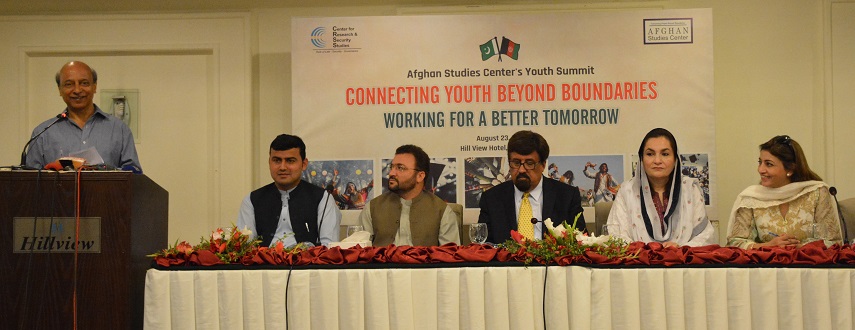The CRSS and its Afghan partner organization OESP’s Pak-Afghan track 1.5/II initiative “Beyond Boundaries” held its fifth meeting of the third phase of the project in Islamabad from 20th to 24th August, 2019. Overall, since October 2015 when this track II initiative started, in total seventeen meeting (in both countries) have been held so far; 12 meetings were held in phases 1 & 2, while this was the 5th meeting in phase 3.
A high level 13-member Afghan delegation, headed by former Member of Afghan Parliament Khalid Pashtoon, arrived in Islamabad on Tuesday 20th August, to discuss bilateral relations with the Pakistani delegation of 13 members in a bid to devise recommendations to present to their governments. The other members of the Afghan delegation included: Eng. Kamal Safi, Member of Parliament (Kunduz); Gul Ahmad Kamin, Member of Parliament (Kandahar); Gulali Noor Safi, Senator and Member of Afghanistan Cricket Board; Elay Ershad, Former Member of Parliament; Saleem Khan Kunduzi, Former Governor Nangarhar Province; Maj. Gen. (retd) Afzal Aman, Former Deputy Minister of Defense; Abdul Hakeem Mujahid, Member of Peace Council, and former Taliban Government’s Permanent Representative to UN; Laila Jaffari, Member of High Peace Council; Fawzia Ehsani, Former Deputy Minister; Mozammil Shinwari; Honorary Advisor, Former Deputy Minister for Trade; Pamir Patang, Security Expert; and Waris Hasrat, Senior Journalist Ariana Television Network News.
While the Pakistan high level 13-member delegation was headed by Dr. Shoaib Suddle, Former IG Police and Federal Tax Ombudsman, other members included: Andleeb Abbas, Member of National Assembly, PTI, and Parliamentary Secretary for Foreign Affairs; Mehnaz Akber Aziz, Member of National Assembly, PML-N; Lt. Gen. (retd) Asif Yasin, Former Defense Secretary; Maj. Gen. (retd) Athar Abbas, Former DG ISPR and Pakistan’s Ambassador to Ukraine; Seema Ilahi Baloch, Former Ambassador; Asif Durrani, Former Ambassador; Mian Sanaullah, Former Ambassador; Dr. Huma Baqai, Chairperson and Associate Dean IBA, and Member of Foreign Affairs Advisory Council; Rehman Azhar, Senior journalist- Express TV; Tahir Khan, Senior journalist GTV News; Nasim Zehra, Senior Journalist, regional analyst and writer; and Hasan Khan, senior journalist and TV anchor at AVT Khyber.
The visit kick started with a dinner hosted by CRSS for the Afghan and Pakistan delegations at Monal restaurant on 20th August.
On Wednesday 21st August, the PAJC Groups bilateral dialogue was held at Serena Hotel, Islamabad, from 9:30 am to 5:00 pm. The bilateral dialogue comprised four sessions.
During the first session, from 10 am to 12:30 pm, the PAJC groups held interactive discussions on: Review of Previous Recommendations- Highlighting the recommendations made in the previous dialogue and Update on progress against these recommendations.
Review of Developments: Facilitators/Roadblocks in the Way of Peace- Political: President Ashraf Ghani’s Successful Visit to Islamabad – Positive Vibes. How this meeting can reset Pak-Afghan Relationship as Dawn of a New Era, given the following? As agreed between PM Khan and President Ghani that the relationship of equality and cooperation can be developed through systematic mechanisms for political, trade, energy and peace and prosperity cooperation. President Ghani said after his interactions with Pakistani leadership, they have developed a joint mechanism for three-tiered task forces: leadership, ministerial, and technical. Trade: How the Torkham Border Opening for 24/7 from August, will impact bilateral and transit trade with regard to increase in volume and addressing the longstanding demands of traders of both countries? Refugees: How the recent extension in the stay of Afghan refugees – till 30th June, 2020 – will help dignified return, rehabilitation and resettlement of refugees in Afghanistan? What more steps need to be taken at the trilateral level including Pakistan, Afghanistan and UNHCR? Pakistan Funded Projects in Afghanistan- Has the successful completion of Pakistan projects in Afghanistan – such as i) Jinnah Hospital in Kabul and ii) Nayab Amanullah Hospital in Logar Province – helped improving the Afghan public perception about Pakistan? Student Visas- How can Pakistan’s new policy on students’ visa – extending the duration of student visa from one-month renewal requirement to one year, in January 2019 – had an impact on attitudes, particularly amongst younger Afghans, about Pakistan? Mr. Toaha Qureshi, Member of British Empire (MBE), Founder Chairman of Forum for International Relations Development, a UK based think tank and CEO of School of Economics and Law, as the international neutral expert.
Speaking at the opening session, Khalid Pashtoon urged all the delegates to stop digging into the blame game of the past and invited both sides to think of solutions of peaceful coexistence for the current and future generations.
Afghan Senator and Member of Afghanistan Cricket Board, Gulalai Noor Safi, stated that to further improve bilateral relations, security issues should not be allowed to impact the flow of trade, as seen in border closures, as it makes both the Pakistani and Afghan traders suffer and, consequently, makes the people in general bear the brunt. Complementing her view, Mehnaz Akbar, Member of National Assembly of Pakistan, suggested to create a bilateral parliamentary group to continue debating issues that affect people on both sides.
Member of Afghan Parliament Kamal Safi was of the view that keeping the Torkham border open 24/7 will not help Afghans until Pakistan’s visa policy is “humanized.” Visa regulations and procedures will need to change to maximize the positive impacts of the Torkham crossing point to be open round the clock. Pakistani delegate and senior journalist and analyst, Tahir Khan, inquired that while Pakistan has taken measures for keeping the Torkham border open 24/7, have the Afghan authorities taken any corresponding measures to facilitate the better movement of people and the greater flow of all goods? He stated that until that occurs, there will be no moving forward.
The second session comprised Interactive discussion on Deliberating the developments critical to Afghanistan Peace Process: Ongoing US-Taliban Doha Peace Talks; Quadrilateral Process including Pakistan, US, Russia and China; PM Imran Khan’s visit to US and Afghan Peace Process, and The Presidential elections in Afghanistan- An opportunity for integration or a spoiler?
Hate does not end hate, only love can. Revenge cannot end revenge, only forgiveness can. War cannot end war, only peace can. Let us rise above hate and revenge, Andleeb Abbas quoted Martin Luther King’s words. She urged both sides to focus on the positives first to mitigate negativity. She was of the opinion that people to people linkages across the border are significantly good but political will has been missing for long at the state level. Though, she optimistically stated that the power of the people is always more than the people in power. Hence, at the people’s level, there must be continued efforts towards peace and development.
Member of High Peace Council Laila Jaffari, from the Afghan delegation, affirmed the need to push both governments to implement the decisions taken under the APAPPS framework. Further, she stated that the government of Pakistan should pressurize the Taliban to hold direct talks with the Afghan government who are the true representatives of Afghan people.
Lt. Gen. (retd) Asif Yasin, former Defense Secretary, responded to the request in a positive manner and apprised the Afghan delegates that Pakistan is already using its full leverage in the Afghan peace talks. The positive outcomes are visible; regional and international powers are also appreciating Pakistan’s role in lubricating the peace process, he explained. However, he maintained that Pakistan can only use its influence but does not have a decisive position. “You can bring the horse to the water but you cannot make it drink,” he said.
Khalid Pashtoon shared that some comments from the opposition leader in the National Assembly of Pakistan have hurt the feelings of the Afghan people. He requested Pakistani politicians to try avoiding linking the Kashmir situation to Afghanistan. Pakistani politicians should be cautious in this regard, he said, as Kashmir and Kabul are mutually exclusive domains.
On the term “strategic depth” that came up in the discussion, Former Ambassador Asif Durrani commented that strategic depth was a non-sensical idea. For now, there is no such thing; if it ever was, it is long dead, he said. Strategic depth comes from a stable space not from an unstable area. After Pakistan and India became nuclear and missile states, such ideas simply vanished. Former DG ISPR and Pakistan’s Ambassador to Ukraine, Maj. Gen. (retd) Athar Abbas, seconded the argument and asked the Afghan delegates for one valid reason how an unstable Afghanistan would benefit Pakistan. A stable Afghanistan has a positive spill-over effect for Pakistan and Pakistan wants nothing but an Afghan-led and Afghan-owned peace process for the people of Afghanistan.
The third session included interactive discussion on: How media on both sides can play its role in improving bilateral relations, addressing misperceptions and disseminating positive outcomes from recent developments? How the civil society can leverage the positive developments on the political front in increasing the people to people contacts including cultural, education and sports exchanges? Building on Beyond Boundaries’ previously formulated recommendations on these areas.
Commenting on the role of the media, senior Journalist and TV anchor, Hassan Khan, said that Afghans are a loving and affectionate people, majority of who hold Pakistan in high regard. However, it is the Afghan media that portrays Pakistan as the enemy and taints perceptions. The media fabricates negative narratives in the minds of the Afghan people, fracturing people to people contacts across the border and affecting the hope for peace in the long run. Former Governor of Nangarhar Saleem Khan Kunduzi remarked that the top priority for the entire Afghan nation for now is only peace; but it depends on the outcome of Doha talks. Let us keep the fingers crossed, he added. As civil society members, he said, we should all be open to certain ground realities but move forward.
The fourth and wrap session included discussions on: Way Forward from the deliberations and debate around the focused themes of the dialogue. Formulation of policy recommendations. 2-3 members each from Pakistan and Afghanistan side drafted the recommendations, while the Chair to read out the policy recommendations. The session ended with the Approval and finalization of policy recommendations in consultation with all the PAJC members.
The joint declaration adopted by the two PAJC groups welcomed:
- The successful visit of President Ashraf Ghani to Pakistan where the Afghan President and Prime Minister Imran Khan agreed to develop a joint mechanism for three-tiered task forces: leadership, ministerial and technical
- The on-going US-Taliban peace process with the hope that it will finally bring peace and prosperity not only for Afghanistan but for the region
- The support of all international stakeholders
- Positive statements by Pakistan government particularly the Prime Minister in support of an Afghan led and Afghan owned peace process
- Opening of Torkham Border on a twenty-four-hour basis by Pakistan which Afghanistan side is expected to reciprocate
The PAJC groups urge the two governments:
- Effective follow-up and implementation of the three-tier task force announcement
- An early finalization of the Afghanistan Pakistan Transit Trade Agreement (APTTA) as discussed during President Ghani’s visit
- To consider increasing trade through a bilateral agreement between the two countries
- To further ease the visa regime for nationals of both countries
- Restart the “Dosti Bus” service from Kabul to Peshawar for which technical feasibility is already initiated
- To encourage media to reflect positive developments in relations between the two countries and to dispel misperceptions that exist in the public mind
On the evening of 21st, the Afghan and Pakistan delegations were hosted by Acting British High Commissioner Mr. Richard Crowder at his residence.
The third day of the visit, Thursday 22nd August two members from Afghan PAJC group and two from Pakistan PAJC visited NUST University, from 10:30 am to 1:00 pm, at the Center for International Peace and Conflict Studies (CIPC), for interaction with youth and academia through lectures/ presentations by members from both the delegations on the Theme: “Pak-Afghan Detente, Afghan Peace Process and the Way Forward”. The university visits are part of the outreach to the youth and academia designed for the initiative to counter misperceptions about each other and improve their understanding on the Pak-Afghan bilateral relations. Afghan Speakers included Khalid Pashtoon, former Member of Parliament and Abdul Hakeem Mujahid, Member of Peace Council, and former Taliban Government’s Permanent Representative to UN. Pakistan Speakers were Mian Sanaullah, former Ambassador and Seema Ilahi Baloch, former Ambassador. The PAJC members for the University Lecture were hosted at CIPC by Dr. Tughral Yamin, Associate Dean, Department of Peace and Conflict Studies. CRSS was represented by Saddam Hussain.
Same day, for the second university visit two members from Afghan PAJC group and two from Pakistan PAJC visited Quaid-e-Azam University (QAU), from 10:30 am to 1:00 pm, at the Defense Strategic Studies (DSS), for interaction with youth and academia through lectures/ presentations by members from both the delegations on the Theme: “Pak-Afghan Detente, Afghan Peace Process and the Way Forward”. Afghan Speakers included Elay Ershad, former Member of Parliament and Mozammil Shinwari, Honorary Advisor, Former Deputy Minister for Trade. Pakistan Speakers were Dr. Huma Baqai, Chairperson and Associate Dean IBA, and Member of Foreign Affairs Advisory Council and Rehman Azhar, Senior journalist- Express TV. The PAJC members for the University Lecture were hosted at DSS by Dr. Shaban Fayyaz, Head of Defense Strategic Studies Department. CRSS was represented Aized Ali and Sitwat Bokhari.
As part of strategic sideline meetings with the Government of Pakistan, the two PAJC Groups held a meeting with the Foreign Minister of Pakistan, Mr. Shah Mahmood Qureshi, at the Ministry of Foreign Affairs, at 2:30 pm. Speaking to the two delegations, the foreign minister said the current tensions with India would not affect Islamabad’s relationship with Kabul: “Border [with Afghanistan] will not be closed nor trade will stop. Why should Afghans suffer because of the idiosyncratic behavior of Narendra Modi.”
“Let me assure you on my behalf and on the behalf of PM Imran Khan that Pakistan will not stop facilitating the Afghan Peace Process, despite tensions with India, Pakistan is totally focused on the situation and its role in Afghanistan”. The message for our Afghan delegation from PM Imran Khan is that Pakistan supports an Afghan led and Afghan owned peace process after completion of the Doha talks. Pakistan does not have any favorites in Afghan Presidential Elections; we will be happy and ready to work with any leader who is elected by the people of Afghanistan to further cement and sustain our brotherly relations.
Later that evening, the two PAJC delegations were hosted for a working dinner by the Afghanistan Ambassador to Pakistan, Mr. Atif Mashal, at his residence.
The fourth day, Friday 23rd August, CRSS and Afghan Studies Center- ASC (an offshoot of Beyond Boundaries) organized a Youth Summit at Hillview Hotel, Islamabad. The summit focused on connecting youth beyond borders to work for a better tomorrow and was attended by the Pak-Afghan youth alumni of ASC, the visiting Afghan delegation and young representatives from High Peace Council, Kabul. The summit was addressed by Addressed by two PAJC Members from Pakistan and Afghanistan, which included Dr. Huma Baqai, Associate Dean IBA, and Member Foreign Affairs Advisory Council, Mehnaz Akber Aziz, Member of National Assembly, Khalid Pashtoon, former Member of Parliament, and Salim Khan Kunduzi, former Governor Nangarhar.
The addresses were followed by an Interactive Q&A session with youth from Afghanistan and Pakistan on: Value of education for peace; Role of youth in peace-building; Impact of Torkham Border being open 24/7; Bilateral Trade; Afghan peace process; and Culture as a bridge between the two people.
Later that day, as part of the strategic communication through media dissemination, two delegates from Afghanistan PAJC Abdul Hakim Mujahid and Engr. Kamal Safi participated at GTV News program ‘Dialogue’ with Tahir Khan, for a discussion on Pak-Afghan bilateral relations. Another programme for GTV was recorded with participation of Afghan and Pakistan delegates Mozammil Shinwari, Elay Ershad, Asif Yasin Malik, Asif Durrani, and CRSS Ex Dir Imtiaz Gul with their views on Pak-Afghan relations and on Beyond Boundaries. While, Afghan delegates Mozammil Shinwari and Elay Ershad, and former Pakistan delegates MNA Shazia Marri and Senator Shibli Faraz participated for a discussion on Pak-Afghan relations at Express TV prime-time show “Center Stage with Rehman Azhar”.
The visit concluded with the departure of the Afghan delegation on Saturday 25 August for Kabul.
The Joint Declaration, detailed reports on the two sideline meetings with Afghan Ambassador and Foreign Minister, detailed reports on university visits to QAU and NUST, detailed report on the Youth Summit, media coverage,TV shows,and picture are appended in the below tabs.

